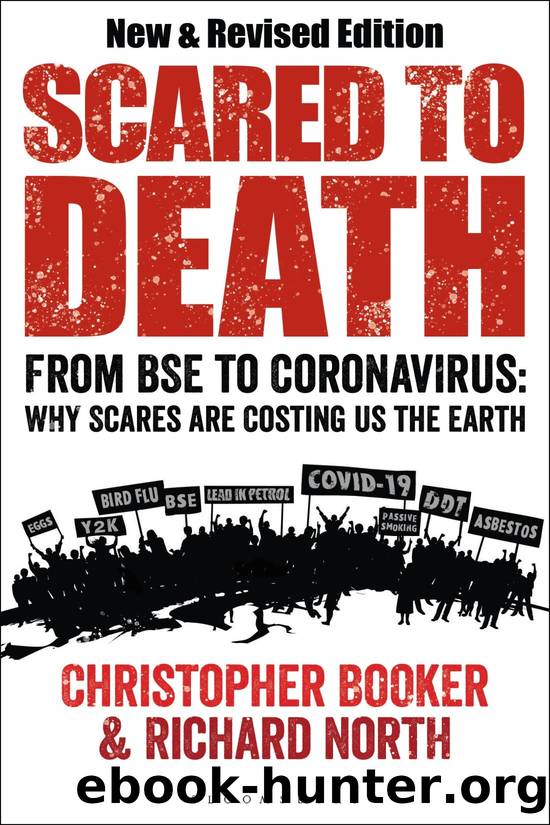Christopher Booker and Richard North by Christopher Booker & Richard North

Author:Christopher Booker & Richard North [North, Christopher Booker And Richard]
Language: eng
Format: epub
Publisher: Bloomsbury Publishing Plc
Stage Three: The Silencing of the Dissenters
By the start of the twenty-first century, the campaign against the menace of passive smoking had already come a long way. In the previous decade, on both sides of the Atlantic, smoking had already become markedly less socially acceptable. The majority of work-places had now either restricted smoking only to rooms specially reserved for the purpose, or banned it altogether, so that a familiar urban sight had become that of little knots of smokers huddled in the street outside office doorways.i Restaurants, pubs and bars were increasingly segregating smokers from non-smokers by designating special âsmoking areasâ, while in many private homes it was no longer allowed at all.
So rapidly had tobacco become socially taboo across the western world that it was now quite a shock to see old news film of political gatherings, even as recent as the 1980s, showing political leaders, such as Chancellors Schmidt and Kohl of Germany, happily lighting up as they sat at the conference table. By 2000 no politician would have dared smoke so publicly in this way.
Despite all these social pressures, and the prominent health warnings now carried by law on all tobacco products (in the EU this had been made obligatory since 1989 under directive 89/622), around a quarter of the adult population were still smokers. After the steep decline of previous decades, the curve had flattened out in the USA and Britain to around 25 per cent. Those still addicted were learning to live with the unacceptability of their habit to non-smokers; and the measures now taken to segregate them from each other were making it much easier than ever before for non-smokers to avoid involuntary exposure.
For the anti-smoking campaigners, however, this was nothing like enough. In 2001 they were furious when Sir Richard Doll, now the most respected epidemiologist in Britain, observed when being interviewed on Desert Island Discs that, âthe effects of other people smoking in my presence is so small it doesnât worry meâ. So convinced were the campaigners that exposure to smoke in even the smallest quantities posed a deadly risk to health that, in more and more areas of public life, they pressed for smoking to be eliminated altogether. So morally self-evident, they believed, was the case for this, that they became increasingly reckless in their readiness to make claims that were not supported by any evidence.f
In 2002, acting through a variety of organizations which could claim to represent the public interest, they stepped up their campaign to a new level. In April, the London Assemblyâs âSmoking in Public Places Committeeâ produced a survey which, it claimed, had found that âa thousand Londonersâ died each year from heart disease caused by passive smoking. But the committee was not yet prepared to call for a complete ban.21
In June, embarrassed by the failure of its earlier study to find any significant link between passive smoking and cancer, the IARC tried to make amends by staging a five-day conference at which â29 experts from
Download
This site does not store any files on its server. We only index and link to content provided by other sites. Please contact the content providers to delete copyright contents if any and email us, we'll remove relevant links or contents immediately.
Blood and Oil by Bradley Hope(1253)
Daniel Holmes: A Memoir From Malta's Prison: From a cage, on a rock, in a puddle... by Daniel Holmes(1121)
Ambition and Desire: The Dangerous Life of Josephine Bonaparte by Kate Williams(1090)
Wandering in Strange Lands by Morgan Jerkins(1020)
It Was All a Lie by Stuart Stevens;(945)
What Really Happened: The Death of Hitler by Robert J. Hutchinson(876)
London in the Twentieth Century by Jerry White(850)
Time of the Magicians by Wolfram Eilenberger(846)
Twilight of the Gods by Ian W. Toll(815)
The First Conspiracy by Brad Meltzer & Josh Mensch(814)
The Japanese by Christopher Harding(804)
A Woman by Sibilla Aleramo(800)
Lenin: A Biography by Robert Service(782)
The Devil You Know by Charles M. Blow(782)
Reading for Life by Philip Davis(777)
Cleopatra by Alberto Angela(771)
Twelve Caesars by Mary Beard(771)
1965--The Most Revolutionary Year in Music by Andrew Grant Jackson(717)
The Life of William Faulkner by Carl Rollyson(716)
